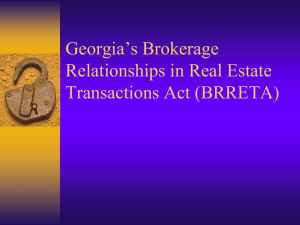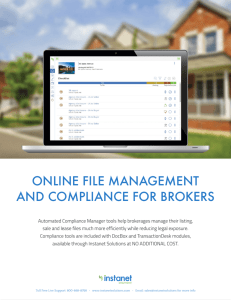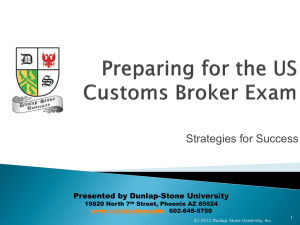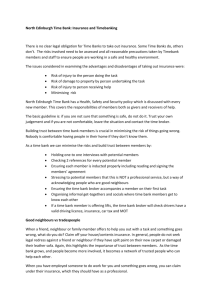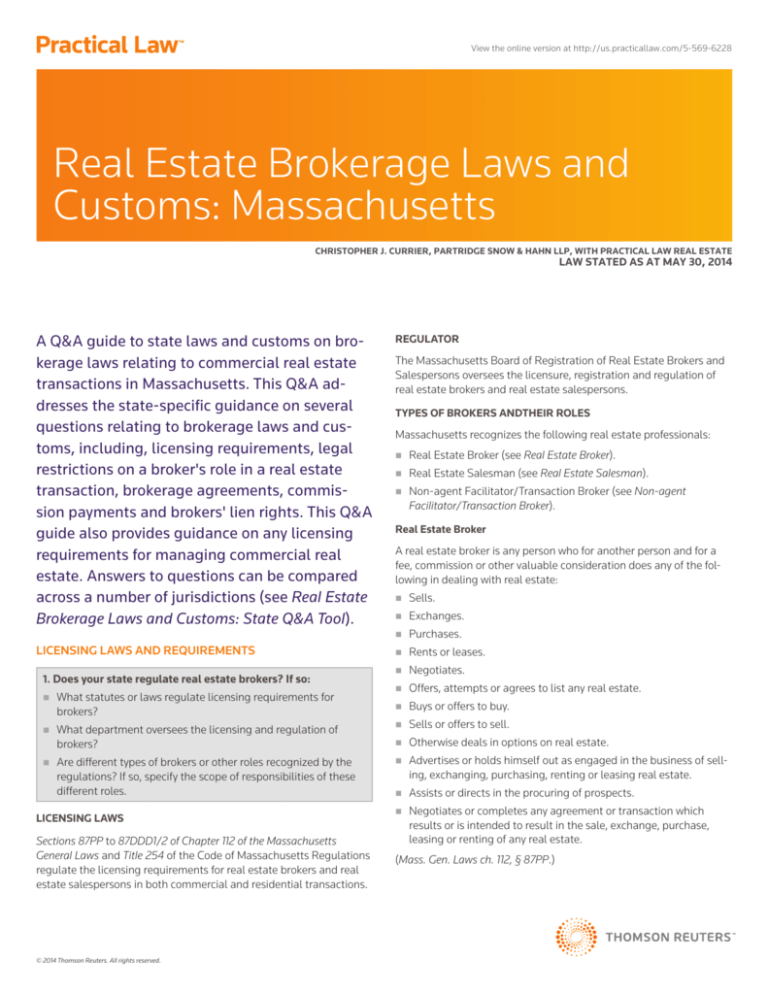
View the online version at http://us.practicallaw.com/5-569-6228
Real Estate Brokerage Laws and
Customs: Massachusetts
CHRISTOPHER J. CURRIER, PARTRIDGE SNOW & HAHN LLP, WITH PRACTICAL LAW REAL ESTATE
LAW STATED AS AT MAY 30, 2014
A Q&A guide to state laws and customs on brokerage laws relating to commercial real estate
transactions in Massachusetts. This Q&A addresses the state-specific guidance on several
questions relating to brokerage laws and customs, including, licensing requirements, legal
restrictions on a broker's role in a real estate
transaction, brokerage agreements, commission payments and brokers' lien rights. This Q&A
guide also provides guidance on any licensing
requirements for managing commercial real
estate. Answers to questions can be compared
across a number of jurisdictions (see Real Estate
Brokerage Laws and Customs: State Q&A Tool).
REGULATOR
LICENSING LAWS AND REQUIREMENTS
Rents or leases.
1. Does your state regulate real estate brokers? If so:
What statutes or laws regulate licensing requirements for
brokers?
What department oversees the licensing and regulation of
brokers?
Are different types of brokers or other roles recognized by the
regulations? If so, specify the scope of responsibilities of these
different roles.
LICENSING LAWS
Sections 87PP to 87DDD1/2 of Chapter 112 of the Massachusetts
General Laws and Title 254 of the Code of Massachusetts Regulations
regulate the licensing requirements for real estate brokers and real
estate salespersons in both commercial and residential transactions.
© 2014 Thomson Reuters. All rights reserved.
The Massachusetts Board of Registration of Real Estate Brokers and
Salespersons oversees the licensure, registration and regulation of
real estate brokers and real estate salespersons.
TYPES OF BROKERS ANDTHEIR ROLES
Massachusetts recognizes the following real estate professionals:
Real Estate Broker (see Real Estate Broker).
Real Estate Salesman (see Real Estate Salesman).
Non-agent Facilitator/Transaction Broker (see Non-agent
Facilitator/Transaction Broker).
Real Estate Broker
A real estate broker is any person who for another person and for a
fee, commission or other valuable consideration does any of the following in dealing with real estate:
Sells.
Exchanges.
Purchases.
Negotiates.
Offers, attempts or agrees to list any real estate.
Buys or offers to buy.
Sells or offers to sell.
Otherwise deals in options on real estate.
Advertises or holds himself out as engaged in the business of sell-
ing, exchanging, purchasing, renting or leasing real estate.
Assists or directs in the procuring of prospects.
Negotiates or completes any agreement or transaction which
results or is intended to result in the sale, exchange, purchase,
leasing or renting of any real estate.
(Mass. Gen. Laws ch. 112, § 87PP.)
Real Estate Brokerage Laws and Customs: Massachusetts
In Massachusetts, a real estate broker is responsible for the supervision
and conduct of the real estate brokerage business. A corporation or
entity may not obtain a brokerage license unless an officer or partner
of the corporation or entity is issued a broker's license as an individual.
The broker that applies for and holds the license on behalf of the
brokerage business is known as the designated officer or partner.
Real Estate Salesman
A real estate salesman is an individual who performs any act or
engages in any transaction included in the description of a real estate
broker, except that a saleman may not complete the negotiation of
any agreement or transaction which results or is intended to result
in the sale, exchange, purchase, renting or leasing of any real estate
(Mass. Gen. Laws ch. 112, § 87PP).
A salesman may not conduct his own business but must be engaged
by a licensed real estate broker.
A salesman must be supervised by a licensed broker who must
approve the negotiation and completion by the salesman of any
transaction or agreement.
A salesman may not be affiliated with more than one broker at the
same time.
Non-agent Facilitator/Transaction Broker
A non-agent facilitator or transaction broker is a licensed real estate
broker or salesman who provides services as a facilitator and does not
represent a purchaser or a seller and does not act in any agency capacity (Mass. Gen. Laws ch. 112, § 87AAA 3/4(f) and Mass. Code Regs.
tit. 254, § 3.00(13)(e)).
2. What are the licensing requirements for brokers and other
roles listed in Question 1?
All real estate professionals must:
Be at least 18 years old.
Be licensed by the Massachusetts Board of Registration of Real
Estate Brokers and Salespersons (Board).
REAL ESTATE SALESMAN
A real estate salesman or salesperson must:
Complete 40 hours of pre-licensure salesperson education
approved by the Board.
Pass the salesperson examination conducted by the Board or
independent testing service designated by the Board.
(Mass. Gen. Laws ch. 112, § 87SS.)
3. What are the on-going requirements for maintaining a
license for brokers and other roles listed in Question 1?
In Massachusetts, all real estate licensees must complete 12 hours of
continuing education course work developed by the Massachusetts
Board of Registration of Real Estate Brokers and Salespersons within
the two-year period immediately preceding the renewal (Mass. Gen.
Laws ch. 112, § 87XX 1/2).
Licensed real estate brokers who are Massachusetts attorneys in
good standing with the Board of Bar Overseers are exempt from the
continuing education requirements (Mass. Gen. Laws ch. 112, §§ 87SS
and 87XX 1/2).
4. What is the best way to determine if a real estate
professional is duly licensed?
The Massachusetts Office of Consumer Affairs and Business
Regulation website can be used to check if a particular real estate
professional is licensed and the status of the license.
5. What is the best way to file a complaint against a real estate
professional for fraud, material misrepresentations, negligent
acts or intentional misconduct?
A formal complaint can be downloaded from Massachusetts Office of
Consumer Affairs and Business Regulation website.
CUSTOMS IN PRACTICE FOR BROKERS
Renew their licenses every two years.
6. With regard to brokers in your jurisdiction, please briefly
describe:
(Mass. Gen. Laws ch. 112, § 87SS.)
The broker's customary involvement in a transaction.
There is no difference between the licensing requirements for
commercial and residential real estate professionals.
REAL ESTATE BROKER
A real estate broker must:
Have at least three years experience as a licensed salesman affili-
ated with a licensed real estate broker.
Complete 40 hours of pre-licensure broker education approved by
the Board.
Pass the broker examination conducted by the Board or indepen-
dent testing service designated by the Board.
Obtain a $5,000 bond posted with the Board.
(Mass. Gen. Laws ch. 112, § 87SS.)
2
Whether there are any restrictions on the broker's role.
BROKER'S INVOLVEMENT
The practice and customs are generally uniform in both commercial
and residential real estate transactions throughout Massachusetts.
Generally, a broker's involvement in key transactions is as follows:
Transfer of Commercial Real Estate. Brokers are very involved in
the initial stages of the transaction, including:
the
preparation of marketing materials;
the
establishment of a listing price; and
the
preparation and negotiation of term sheets which are usually non-binding. Brokers may be involved with the preparation
of offers, but attorneys are more often involved at the offer
stage. Brokers typically stay actively involved throughout the
contract period.
© 2014 Thomson Reuters. All rights reserved.
Real Estate Brokerage Laws and Customs: Massachusetts
Transfer of Residential Real Estate. Brokers are typically in-
volved in the establishment of a listing price and in the preparation
and negotiation of an offer to purchase. Some brokers prepare an
industry standard purchase and sale agreement, but attorneys are
involved in the negotiation and completion of the contract. Brokers
typically stay actively involved throughout the contract period.
Leases of Commercial Real Estate. Brokers are typically involved
in preparation of marketing materials, the establishment of a
rental rate and in the preparation and negotiation of term sheets
which are usually non-binding. Brokers may be involved with the
preparation of offers, but attorneys are more often involved at the
offer stage. Brokers typically stay actively involved throughout the
lease negotiation process.
Leases of Residential Real Estate. A real estate broker typically
prepares the lease agreement by filing in the blanks in an industry standard residential lease form. Real estate attorneys are not
widely used for residential tenancies unless they involve multifamily apartment buildings.
RESTRICTIONS ON BROKER'S INVOLVEMENT
Section 46a of Chapter 221 of the Massachusetts General Laws prohibits the unauthorized practice of law in Massachusetts.
Whether a particular activity constitutes the practice of law in
Massachusetts "must be decided upon its own particular facts" (In re
Chimko, 831 N.E.2d 316, 321 (2005)).
CUSTOMS IN PRACTICE FOR ATTORNEYS
7. With regard to real estate attorneys in your jurisdiction,
please briefly describe:
When an attorney becomes involved in the transaction, if at all.
If an attorney can receive commission without a real estate
broker license?
Whether the attorney is exempt from the licensing regulations
in Question 1.
Whether an attorney can act as broker and legal counsel in the
same transaction? If so, are any disclosures required?
INVOLVEMENT
In commercial transactions, attorneys usually get involved at the term
sheet and offer stage and then negotiate and complete the contract
or lease. However, in residential transactions, attorneys do not usually
get involved until the contract stage. Attorneys are rarely involved in
residential leasing transactions.
COMMISSION
In Massachusetts, an attorney may not receive commissions without
having a real estate broker's license.
EXEMPTION FROM LICENSING REGULATIONS
Massachusetts attorneys in good standing with the Board of Bar
Overseers are exempt from the examination, education and apprenticeship requirements. To obtain a broker's license, licensed attorneys
in good standing need only to complete the application and pay the
required fee (Mass. Gen. Laws ch. 112, § 87SS).
© 2014 Thomson Reuters. All rights reserved.
ACTING AS BROKER AND LEGAL COUNSEL
An attorney may not act as a broker and counsel on the same
transaction without a full disclosure and a signed waiver by the client.
Generally, an attorney has a conflict of interest if the attorney has a
personal stake in the outcome of a transaction. For example, an attorney's obligation to advocate for the client might be compromised if
the attorney receives a commission when the transaction is complete.
BROKERAGE AGREEMENTS
8. Please describe different brokerage agreements commonly
used in your jurisdiction between individuals selling or leasing
their property and the brokers.
Generally, exclusive and non-exclusive brokerage agreements are used
in Massachusetts for both commercial and residential transactions.
The types of listings used in Massachusetts are:
Open listing. This is where the broker has the right to bring pro-
spective purchasers to the see the property. If the purchaser purchases the property, the broker earns a commission. Open listings
can be given to several brokers. However, this arrangement is not
customarily used in Massachusetts and is not popular with brokers
because they cannot effectively market the property.
Exclusive agency listing. This is where one broker lists and
markets the property, and obtains a commission if the property
sells or is rented though that broker, any broker or any real estate
company. The terms of these agreements are typically negotiable.
Exclusive right to sell or lease listing. This is the most commonly
used listing agreement. In this arrangement, the broker receives a
commission no matter who finds the purchaser or tenant. In contrast to an exclusive agency listing, a commission is due even if a
broker or real estate company did not find the purchaser or tenant.
If the seller or landlord finds a purchaser or tenant independently
of the broker, then a commission would still be owed to the broker,
but the parties may negotiate to exclude certain potential purchasers or tenants that the seller or landlord has previously contacted.
Multiple listing. This is an arrangement available in residential
markets only. Individual real estate brokers in a particular area
pool their listings. The broker provides certain listing information
to the Multiple Listing Service (MLS) office, where it is coordinated
with listings from other members. The listings are then published
to all MLS members, any of whom may sell any listed property. If a
sale of property is made by someone other than the broker which
took the listing initially, the commission is divided between the
listing and selling broker. Multiple listing is typically used with the
other listing arrangements used in Massachusetts.
Net listing agreements are prohibited in Massachusetts.
9. Is there a customary tail period for exclusive brokerage
agreements?
Tail perio+ds are negotiated on a case by case basis and tails for
commercial property are generally longer than tails for residential
property.
Tails generally range from 90 days to six months.
3
Real Estate Brokerage Laws and Customs: Massachusetts
COMMISSION PAYMENTS
10. With regard to commissions in your jurisdiction:
Does a broker need a written brokerage agreement to claim its
commission?
When is a broker entitled to its commission?
May a commission be earned if the closing does not occur?
Are there any statutory restrictions on commission rates?
If the parties are permitted to negotiate a commission, what is
the customary range for commission rates.
WRITTEN BROKERAGE AGREEMENT
In Massachusetts, a written agreement is not required to seek enforcement of unpaid commissions. Under Section 1 of Chapter 259
of the Massachusetts General Laws, an agreement for brokerage
services does not require the execution of a written contract to be
enforceable under the Massachusetts Statute of Frauds.
TIMING OF COMMISSION PAYMENT
Generally, the commission is payable at the closing of the transaction, either the execution of a lease by both parties or the closing of a
contract for the sale of property. However, the timing of payment of
a commission is generally heavily negotiated with most agreements
providing that no commission will be due until the closing and the full
payment of the consideration by the purchaser or tenant, as applicable.
COMMISSION PAYMENT WITHOUT CLOSING
In Massachusetts in a sale transaction, the broker earns a commission
when all of the following occur:
The broker produces a purchaser who is ready, willing and able to
buy on the terms fixed by the owner.
The purchaser enters into a binding contract with the owner to buy
on the terms fixed by the owner.
The purchaser completes the transaction by closing the title in ac-
cordance with the provisions of the contract.
(Tristram's Lending, Inc. v. Wait, 327 N.E.2d 727, 729 (1975).)
If the contract is not completed because of the purchaser's finances or
because of any other default of the purchaser, there is no right to a commission against the seller (Tristram's Lending, Inc., 327 N.E.2d at 732).
However, if the failure to complete the contract is because of a wrongful act of or interference by the seller, the broker's claim for a commission is valid and must be paid (Tristram's Lending, Inc., 327 N.E.2d at
732 and Lobosco v. Donovan, 565 N.E.2d 819, 821 (Mass. App. Ct. 1991)).
No commission is due if either:
The sale fails through no fault of the owner (Hills v. Lake, 646
N.E.2d 1081, 1085 (Mass. App. Ct. 1995)).
A broker has produced a purchaser but the sale did not occur be-
cause a municipality exercised its right of first refusal (Dalvis, Inc. v.
Coz, 594 N.E.2d 890, 892-93 (Mass. App. Ct. 1992)).
RANGE OF NEGOTIATED RATES
The customary range of negotiated rates for residential and commercial transactions is 4-6% of the gross selling price of the real estate.
11. Is it customary for the seller or the landlord to pay the
commission? If so, how is payment to the purchaser's or
tenant's broker usually ensured?
In Massachusetts in sale transactions, the seller typically pays the
commission in both residential and commercial transactions. The
seller enters into a brokerage agreement with a broker that obligates
the seller to pay the broker a commission upon the occurrence of
certain events (see Question 10).
The seller's broker usually then enters into a co-brokerage agreement
with the purchaser's broker. The seller's broker provides the purchaser's broker with its portion of the commission under the co-brokerage
agreement.
In commercial leasing transactions, the landlord generally pays the
commission, which is usually paid out over a period of time outlined
in a schedule attached to the brokerage agreement. The landlord's
broker usually then enters into a co-brokerage agreement with the
tenant's broker. The landlord's broker provides the tenant's broker
with its portion of the commission under the co-brokerage agreement. It is common for brokers to earn commissions on lease renewals with the same tenant where options in the lease are executed.
12. Is fee splitting permitted or customary in your state? If so,
are there any restrictions?
Fee splitting is permitted in Massachusetts. However, Massachusetts
laws limit the splitting of fees, commission or other compensation
received by a real estate broker with other licensed real estate brokers
or salespersons.
13. When real property is sold, is the grantor deemed released
from any deferred commission payment obligations that are
scheduled to come due after the transfer of fee title to the
grantee or must there be an express release? Are deferred
commission payments automatically assumed by the grantee
or must the assumption be express?
GRANTOR RELEASE FROM DEFERRED COMMISSION
A grantor is not deemed released from any deferred commission
obligations because deferred commission payments do not run with
the land and the obligations follow the grantor.
GRANTEE'S ASSUMPTION OF DEFERRED COMMISSION
The brokerage agreement controls how this is handled. It is typical for
grantees to assume the obligations for deferred commission payments but it is negotiable.
STATUTORY RESTRICTIONS
In Massachusetts, commission rates are not prescribed by law but
negotiated by the parties.
4
© 2014 Thomson Reuters. All rights reserved.
Real Estate Brokerage Laws and Customs: Massachusetts
COSTS
14. With regard to the marketing and advertising costs
associated with the listing:
Does a broker typically pass on these costs to the seller or the
landlord?
Are provisions dealing with these costs usually found in
exclusive or non-exclusive agreements, or both?
REIMBURSEMENT OF COSTS
Local customs and market conditions govern the reimbursements of
costs.
In a commercial transaction where the broker has an exclusive agreement, the seller or landlord typically reimburses the broker for its
marketing and advertising costs. However, reimbursement of marketing and advertising costs in commercial transactions is negotiable
and costs can be capped at a specific amount.
In residential transactions or lease transactions, there is typically no
reimbursement of marketing and advertising costs.
Reimbursement of marketing and advertising costs is generally paid
with the commission the broker receives at the closing. Brokers may
also negotiate to include a separate marketing budget for commercial properties where the seller agrees to pay those costs regardless
of whether the property is sold.
COST PROVISIONS
Provisions dealing with the reimbursement of marketing and advertising costs are more likely to be found in exclusive brokerage agreements. However, these provisions are usually negotiable.
DISCLOSURE LAWS
15. Describe any disclosure laws affecting real estate brokers
or salespersons. Is a broker required to disclose its dual
agency?
GENERAL DISCLOSURE LAWS
All brokers and salespersons engaged in renting real property must
provide each prospective tenant with a written notice which states all
of the following:
Whether the prospective tenant must pay any fee for the service.
The amount of the fee.
The manner and time in which the fee is to be paid.
Whether or not the fee or any portion of the fee must be payable by
the tenant if a tenancy is not created.
Additionally, a broker must provide disclosures concerning the
dangers of lead based paint on approved forms before a potential
purchaser makes an offer on a particular property.
DUAL AGENCY DISCLOSURE
In Massachusetts, real estate brokers or salespersons may act as dual
agents representing both prospective purchasers and sellers. These
brokers or salespersons must obtain informed written consent from
both the seller and the prospective purchaser (Mass. Gen. Laws ch.
© 2014 Thomson Reuters. All rights reserved.
112, § 87AAA 3/4(b)). This consent must be in the form prescribed by
the Massachusetts Board of Registration of Real Estate Brokers and
Salespersons and must be signed and dated (Mass. Gen. Laws ch. 112,
§ 87AAA 3/4(b)).
This written consent may be obtained when an agency relationship
with the seller or purchaser is created, but notice of a dual agency
relationship must also be given to the prospective purchaser and to
the seller after a listed property is first shown to the purchaser (Mass.
Gen. Laws ch. 112, § 87AAA 3/4(b)).
However, brokers and salespersons are not required to provide written notice to each prospective purchaser or seller who attends an
open house showing of real property if the broker or salesperson
conspicuously discloses the agency relationship (Mass. Gen. Laws ch.
112, § 87AAA 3/4(b)).
The dual agency disclosure requirements apply only to the intended
purchase or sale of land either:
With a building intended to be used as one to four residential
dwellings.
On which a building is intended to be constructed for use as one or
two residential dwellings.
(Mass. Gen. Laws ch. 112, § 87AAA 3/4(a).)
BROKER'S LIENS
16. Can a broker file a lien against real property if it has a claim
for its commission? Is a broker's lien an inchoate lien?
FILING A LIEN
Massachusetts law does not provide for a broker's lien against real
property based on unpaid commissions. Brokers with unpaid commission claims may pursue an action for a breach of contract claim.
BROKERS' LIENS AS INCHOATE LIENS
Massachusetts law does not provide for a broker's lien against real
property.
17. How can a real property owner remove a broker's lien?
Massachusetts law does not provide for a broker's lien against real
property.
MANAGING REAL ESTATE
18. Is a broker's license required to manage real estate and
collect rents on behalf of a landlord? If so, what are the
statutes regulating the licensing requirements?
In Massachusetts, a broker's license is not required for:
Employees of real estate owners if the employees are performing
the acts of a real estate broker or salesman for the subject
property and if these acts are performed in the regular course of,
or incident to, the management of the property.
Any management agent (or regular employees of the agent acting
on the agent's behalf in the regular course of business) while
acting under a contact with a real estate owner.
5
Real
Estate Brokerage
Laws
and
Customs:
Massachusetts
Infrastructure
Investment
Act:
New
York's Design
Build Law
Massachusetts does not have other licensing requirements for
property managers.
(Mass. Gen. Laws ch. 112, § 87QQ.)
Toolkit
Office Leasing Toolkit
(http://us.practicallaw.com/5-506-2518)
State Q&A Tool
For the links to the documents referenced in this note, please visit
our online version at http://us.practicallaw.com/5-569-6228
Real Estate Brokerage Laws and Customs: State Q&A Tool
(http://us.practicallaw.com/2-535-6065)
State Q&A
Real Estate Finance: Massachusetts
(http://us.practicallaw.com/7-500-3877)
RELATED CONTENT
Topic
Commercial Leasing
Real Estate Leasing: Massachusetts
(http://us.practicallaw.com/6-500-3986)
Real Estate Ownership: Massachusetts
(http://us.practicallaw.com/9-500-4084)
Commercial Ownership
Real Estate
Real Estate in Corporate Transactions
Practice Notes: Overview
Multistate Real Estate Leasing: Overview
(http://us.practicallaw.com/9-500-5192)
Practice Notes
Investments in US Real Property by Non-US Investors:
Basic FIRPTA Rules
(http://us.practicallaw.com/4-520-5216)
Office Leasing: Guide to Summarizing a Lease
(http://us.practicallaw.com/3-503-9307)
Office Leasing: Key Provisions in an Office Lease
(http://us.practicallaw.com/6-503-7910)
Office Leasing: Letters of Intent
(http://us.practicallaw.com/2-503-8544)
Standard Document
Office Leasing: Agreement of Lease (Pro-landlord Long
Form NY)
(http://us.practicallaw.com/1-503-8361)
Checklists
Office Leasing: Tenant's Pre-signing Checklist
(http://us.practicallaw.com/2-505-1724)
Office Leasing: Tenant's Pre-signing Flowchart
(http://us.practicallaw.com/1-505-9457)
ABOUT PRACTICAL LAW
Practical Law provides legal know-how that gives lawyers a better starting
point. Our expert team of attorney editors creates and maintains thousands of
up-to-date, practical resources across all major practice areas. We go beyond
primary law and traditional legal research to give you the resources needed to
practice more efficiently, improve client service and add more value.
If you are not currently a subscriber, we invite you to take a trial of our online
services at practicallaw.com. For more information or to schedule training,
call 888.529.6397 or e-mail ustraining@practicallaw.com.
06-14
© 2014 Thomson Reuters. All rights reserved. Use of Practical Law websites and
services is subject to the Terms of Use (http://us.practicallaw.com/2-383-6690)
and Privacy Policy (http://us.practicallaw.com/8-383-6692).
6

